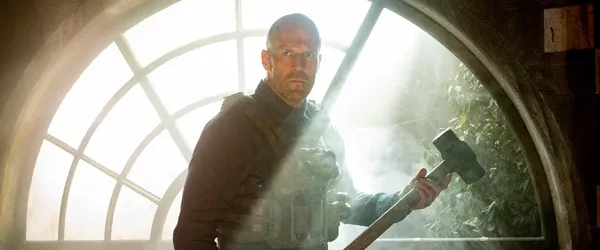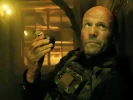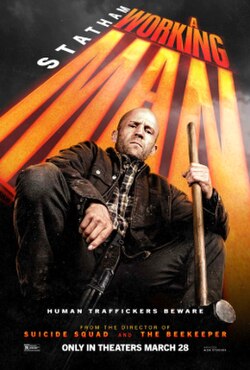Eye For Film >> Movies >> A Working Man (2025) Film Review
A Working Man
Reviewed by: Andrew Robertson

A Working Man is yet another outing for a particular flavour of retributive escapism. Like Death Wish, Die Hard, and (Rambo) First Blood it's based on a novel, but what's astonishing is that despite tonal similarities to works from the 1970s the source novel is from 2014.
This review was delayed in part because I wanted to track down a copy. The film having been produced (and co-written) by Sylvester Stallone, I wondered how much of Chuck Dixon's novel Levon's Trade had made the transition to screen. I wondered how much of its regressive tendencies had been added. Among the film's bad habits there's the obligatory dead wife, the fetishisation of special forces, as with Taken the complications inherent in the layered politics of human trafficking, some queer-coded villainy and almost inevitably lockstep adherence to the monomyth of the hero's journey.

What astonished me more than the initial realisation that the novel, the first of a series of about ten, was ten years old and not 50, was how much more progressive and positive A Working Man is than its source. I'd thought its old-fashioned sensibilities were brought in by Stallone, perhaps with a bit of moderation from David Ayer. Ayer's fresh off The Beekeeper and I'd suspected there that the inevitable outcome of this genre was intersection with 'proper binmen-ism'. It turns out that there's still some granularity as we work through blue collar professions. While we've had a bricklayer, Levon's job in the book is site security and in the film something a bit woollier but more in the direction of foreman. I'd have said site supervisor or health and safety co-ordinator, but those don't have the word 'man' in them.
I say 'job' because Levon's Trade, unsurprisingly, is violence. As it's Jason Statham there's a bit of complexity in terms of reconciling participation in the Global War on Terror with nationality, but in the same way we can thank Thatcher for being able to buy stamps in ordinary shops I guess Blair's legacy will include career opportunities for retired Commonwealth Games athletes. Where the book's Levon is a former Marine, and elements of that remain, including inter-service rivalries and friendship, the animated opening uses the British and American flags among silhouettes that juxtapose combat and construction. In retrospect it could have been a bit Dad's Army but it's closer to the sequence in Casino Royale. It'd be one of the brighter elements in a film which joins the bandwagon of using colour-grading for grittiness, but it's outshone by later baddies who've got garish tracksuits optimised as camouflage in Regency drawing-rooms or Chinese takeaways.
There's a good bit in the book where 'Gunny' Lefferty (David Harbour in the film) explains to Merry (Isla Gie) how well her daddy did in survival training, and while that made me think of Trautman's monologue in First Blood and had parallels with The Hunted it didn't make it into the film.
It's one of the few details that might be missed. Ayer's connection with Michael Pena from Harsh Times and End Of Watch brings much more depth to one of the stories' four fathers. That's numerical, not preceding, though as with The Beekeeper the debts this owes to other stories invite comparisons but also suggest squandered inheritances. Pena is father to Jenny (Arianna Rivas) who disappears on a night out. One of the film's real strengths is allowing Rivas to flesh out the book's (Miss) McGuffin into an actual person. There are perhaps shades of 'good victim' rhetoric but discovering that the film's significantly less sexist than the novel was one of the many surprises.
Levon is motivated in part by conflict with his widow's father, Merry's grandfather, played by Richard Heap. He's a mental health professional of some stripe, though in the film he too is a widower. The film does a lot more to explain and justify his antagonism towards Levon, indeed he's significantly more sympathetic. The line "I can acknowledge that," and his faintly hippy stylings are perhaps obvious shortcuts to suggest 'liberal' leanings, but it does allow for a complexity of motivation that's totally lacking in the book. The form of his opposition is quite distinct from that of Jason Flemyng's Wolo Kolisnyk. His son, 'Dimi', played by Maximilian Osinski is among the many flavours of Eastern gangsters that will provide fodder for Statham's kicking, punching, and unregistered firearms. As with Den Of Thieves it's perhaps not intentionally about crises in masculinity, but it's hard not to view it through that lens.
Chuck Dixon has a background in comic books, including titles like The Punisher. It was another comic book writer, Gail Simone, who before putting fresh meat on the bones of Deadpool and giving wings to Gotham's Birds Of Prey ran a site called Women In Refrigerators. Named after what was probably the most notorious incident in Green Lantern before the film it's become a shorthand for casualisation of violence towards one character as motivation for another. The film is bad enough, but the book is so wedded to it as a plotting convenience that one wonders if there was a bulk discount.
The biggest difference between the book and the film is that I enjoyed the latter enough to want more. With ten or so in the series now, category difficulties with intersitital novellas aside, it's not surprising that Hollywood came calling. There have been multiple attempts at other series with oddly capable protagonists like Jack Reacher and Alex Cross and Robert Langdon. In comparison to the book this has a more definite ending, indeed it's more sympathetic to some of its antagonists perhaps because they get a chance to express motivations more complex than committing sexual assault or purchasing appliances.
There is product placement for DeWalt (power tools) and I think maybe Dodge. There's potentially something in the fact that the baddies all drive European cars. There are some reasonable action scenes, though as I think on it the only one that shows any real invention or character is at the beginning. Though Levon will later use environment to his advantage that's the only one where improvising, adapting, and overcoming has the feel of Jackie Chan rather than the pedestrian. There's a biker gang who've been doing well enough from the meth trade to afford a hideout that's as much arcade cabinet as Game Of Thrones. There's a backwoods retreat which hosts a 1920s casino night, and if that seems too many ingredients it's in good company in a film that had the opportunity to throw in a kitchen sink at a discount but doesn't take it. The Russian-flavoured criminal enterprise is a tradition something Hollywood's been borrowing from for some time, but with varying quality. As products go this is an off-brand alternative, a John Wick, but ordered from Wish.
Reviewed on: 02 May 2025


















